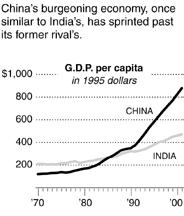A friend forwarded me this article from the NYT by Keith Bradsher about the widening gap between Indian and Chinese economic progress.
 |
India's continued backwardness compared with its neighbor across the Himalayas has become a national obsession. The world's two most populous countries, China and India were close economic rivals just two decades ago, each struggling to bring progress to vast numbers of impoverished peasants.
But now China, by quickly converting much of its economy to an unfettered and even rapacious version of capitalism, has surged far ahead. The average Chinese citizen now earns $890 a year, compared with $460 for the typical Indian, according to the World Bank. |
Only slightly more numerous than Indians these days, Chinese citizens now buy one-third more cars and light trucks each year, 3 times as many television sets and 12 times as many air conditioners. China has high-speed freeways, modern airports and highly efficient ports that are helping it dominate a growing number of manufacturing industries.
The article isn't particularly well researched and focuses predominantly on a single (albeit compelling) anecdote of a businessman who has to source raw materials & machine tools for his shoe factory from China. A few of the issues which stymied his attempts to approach Chinese productivity levels:
-
a max factory size of 150 vs. up to 20,000 in a Chinese factory
-
unreliable local electricity grids
-
zoning laws limiting amount of land that can be owned by a commercial entity
-
poor logistics resulting in capital tied up in inventory
-
his focus on the domestic market rather than international ones
Being the NYT, they would never allow India's minimum wage laws to be identified as a root cause:
The minimum wage for urban industrial work here is $3 a day. While fairly high by the standards of very poor countries, it is lower than the wages in Guangdong, where competition for skilled shoemakers has pushed up pay.
Bradsher is attempting to say "minimum wages aren't the root cause because some in Guangdong make more than that" -- a preemptive jab at neo-laissez-faire arguments. However, the counter point to this assertion is that at some point in Guangdong, there HAD to have been workers who earned far less than the minimum wage. More directly, there probably are "less skilled shoemakers" in Guangdong today who earn below that level.
The NYT article, however, does not elaborate on the underlying, philosophical threads causing this differences in growth rates. I'll step somewhat outside of my safe zone of knowledge and propose a couple ideas:
-
In the 20th century, China more thoroughly embraced economic statism, more graphically saw its results, and has now more thoroughly discarded it. The average individual in India, by contrast, still has more comparative faith in the ability of government ministries to produce/secure wealth for the country.
-
The article does mention the "obsession with equality" in Indian politics. In India, to a greater degree than free wheeling China, wealth is almost axiomatically viewed as being non-virtuous. If you're rich, you must have done something wrong. If you're poor, you're virtuous. If you're in government, your job is to reallocate wealth according to virtue against the prevailing hierarchies of "free" society.
-
China has a healthier view of the relationship between economic and political development. One commentor I read years ago mentioned "India has an overactive democracy and an underactive economy." The "virtuous poor" of India are also much more vocal and recipients of a sympathetic ear than their counterparts in China. The product of this is crushing regulations and belief in redistributive policies. This is quite reminiscint -- although on a much more massive scale -- of the situation in
East Germany.
-
The Chinese state, much like MITI in Japan in earlier decades, is not just "out of the way" of influential entrepreneurs but is aggressively providing them with direct state machinery to make big projects happen. Is there a village in the way of your plan to build a factory? No problem, we can make it go away.


